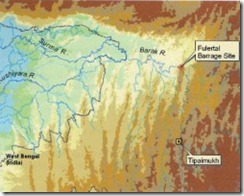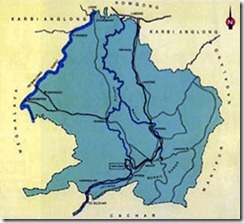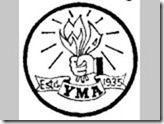 Aizawl, Nov 23 : With its alcohol content having been reduced to 11 per cent, the Mizoram-produced grape wine Zawlaidi would no more attract any buyers in the dry land, vendors feared.
Aizawl, Nov 23 : With its alcohol content having been reduced to 11 per cent, the Mizoram-produced grape wine Zawlaidi would no more attract any buyers in the dry land, vendors feared.  New Delhi, Nov 23 : With concerns growing about the harm the Tipaimukh dam will wreak on the ecology, agriculture and fisheries downstream, Bangladesh yesterday urged India to hold consultations with it and share all relevant information before it implemented the hydroelectric project.
New Delhi, Nov 23 : With concerns growing about the harm the Tipaimukh dam will wreak on the ecology, agriculture and fisheries downstream, Bangladesh yesterday urged India to hold consultations with it and share all relevant information before it implemented the hydroelectric project.
The 1,500-MW project is located on the Barak river near India's Manipur-Mizoram border just off Bangladesh's Zakiganj border in Sylhet. The Barak enters Bangladesh as the rivers Surma and Kushiyara.
Concern heightened in Bangladesh after news broke that India's state-owned enterprise NHPC had signed a Promoter's Agreement on October 22 with the government of Manipur and Sutlej Jal Vidyut Nigam Ltd to set up a joint venture company for the implementation of the controversial project.
“The government of India should share all relevant details of the proposed project in full transparency and also about any further step that it may take in connection with the project,” said a statement by Bangladesh's foreign ministry yesterday.
“This will be critical in avoiding any gap in understanding or allaying concerns in Bangladesh,” said the statement, which was issued five days after the news broke.
“Bangladesh, as a co-riparian country, would like to underscore the need for prior consultations before there is any intervention on common rivers like the Barak,” it said.
In its response to the development, the opposition BNP yesterday announced a daylong hartal on December 1 in Sylhet, which it said would be hardest hit by the Indian move.
India defends the project by suggesting that it is a hydroelectric project with provision to control floods and there is no plan to divert water for irrigation.
Experts in Bangladesh say the massive embankment dam will disrupt the flow of the Barak river and adversely affect agriculture and fisheries downstream. They also note that the project sits on an earthquake region and will cause havoc in the event of a quake.
Rights groups in Manipur have also been vocal in their protest. Their concern is that the project will displace thousands of local people.
The Bangladesh foreign ministry statement said its attention had been drawn to recent press reports about the signing of a Promoters' Agreement concerning the proposed Tipaimukh Dam project, in the Indian State of Manipur, on the river Barak.
Dhaka has also noted that the Indian external affairs ministry in a statement yesterday said the proposed project was designed to be “a hydroelectric project with provision to control floods”. As such, this project would not involve any diversion of water for purposes of irrigation.
The Dhaka statement said Bangladesh further took note of the reiteration in the press briefing that “…during the visit of H. E. Sheikh Hasina, Prime Minister of Bangladesh to India in January 2010, our Prime Minister had reiterated the assurance that India would not take steps on the Tipaimukh project that would adversely impact on Bangladesh. The assurance was again reiterated during the visit of our Prime Minister to Bangladesh in September 2011”.
No adverse impact of Tipaimukh on Bangladesh
Taken aback by loud protest in Bangladesh over the proposed Tipaimukh Dam Projects in Manipur, the Government of India is toying with the idea of inviting another delegation from the neighbouring country to visit the Project site.
Highly placed sources said that India wanted the Bangladeshis to see for themselves that there was no dam, no construction and no project work going on in the area. The Project would require environment clearance, said highly placed sources.
Meanwhile, India has on Tuesday formally declared that Tipaimukh project would have no adverse impact on Bangladesh.
An official spokesperson said, the only recent development pertaining to the project has been the signing of a ‘Promoter’s Agreement’ with the purpose of setting up a Joint Venture Company (JVC) between the Government of Manipur, NHPC Ltd. and Sutlej Jal Vidyut Nigam Ltd (SJVN) on October 22.
A 10-member Bangladesh Parliamentary delegation led by Abdur Razzak, former Water Resources Minister and current Chairman of the Parliamentary Standing Committee on Water Resources, had visited India in July 2009 at the invitation of Government of India.
It had been clarified to the delegation that the proposed project was a hydro-electric project with provision to control floods and that this would not involve diversion of water on account of irrigation.
“Subsequently, during the visit of Prime Minister, Sheikh Hasina to India in January 2010, our Prime Minister had reiterated the assurance that India would not take steps on the Tipaimukh project that would adversely impact on Bangladesh. The assurance was again reiterated during the visit of our Prime Minister to Bangladesh in September 2011”.
In Bangladesh, reports of floating of a JVC has led to huge furor, and Bangladesh Foreign Ministry issued a statement, disclosing that India had promised to give details of the deal signed recently by National Hydro Power Company, Sutlej Jal Vidyut Nigam Limited and the Manipur Government to build the 1,500-MW project.
Media in Bangladesh have reported that the Tipaimukh Dam would decrease water flow in the Barak River during the monsoon, reduce the navigability of the Surma and the Kushiyara, dry up some water bodies and increase riverbank erosion 100-150km downstream.
 Guwahati, Nov 23 : Celebrity Management Group (CMG), a leading event management organization of the country, has proposed to set up the North East Premier League (NEPL) from next year onwards.
Guwahati, Nov 23 : Celebrity Management Group (CMG), a leading event management organization of the country, has proposed to set up the North East Premier League (NEPL) from next year onwards.
Disclosing this here today, All India Football Federation (AIFF) vice-president and convener of NEPL Ankur Dutta said AIFF has already given the go ahead signal to the organisers. Dutta said he had submitted the proposal and AIFF agreed to the concept.
After getting the green signal, he approached the Kolkata based CMG, which was instrumental in bringing Maradona and Argentina-Venezuela international soccer friendly to Kolkata, which readily agreed to support the NEPL.
Presenting the whole project, CMG managing director, Bhaskar Goswami said it will be an eight team event.
Apart from top teams of the seven States, the second best team of the region will be picked for the championship which will last for nine weeks during which 61 matches will be played, informed Goswami.
All the teams will play in home and away basis. After the league phase among two groups, top two teams will qualify for the semifinals. No official teams like ASEB, Assam Police, etc., will be allowed as the participating teams have to be private clubs.
The vision behind the competition is to give exposure to the talented players of this region as all the matches will be telecast live. Players and teams will also be benefited with lucrative offers.
Goswami further mentioned that teams may include three overseas players and it will be mandatory to put six players of U-21 years.
The NEPL is likely to start after the ongoing I-League which is scheduled to be completed by March next. Goswami clarified that the tournament will be run by a governing council and no State associations or clubs will be allowed to conduct the matches.
 Silchar, Nov 23 : Dimasa organizations in Assam's Dima Hasao district have expressed concern over the demand for a supra state body by the NSCN (IM).
Silchar, Nov 23 : Dimasa organizations in Assam's Dima Hasao district have expressed concern over the demand for a supra state body by the NSCN (IM).
Jadike Naiso Hosom (JNH), the apex body of Dimasas, said on Tuesday,"We have come to understand that Nagas have been offered a supra state body in Naga inhabited areas of Manipur, Assam and Arunachal Pradesh. If the demand is fulfilled, parts of Dima Hasao district of Assam will also be included in the supra state body. It will only create new problems in the area and will cause a threat to people belonging to Dimasa and other non-Naga communities living here. It will have serious implications on mutual co-existence of different communities in the region," said a statement signed by JNH publicity secretary Dhoneswar Batari.
JNH urged the government not to succumb to the demand of the NSCN (IM). The Dimasa apex body also called upon the people of Assam to keep vigil along all the areas bordering Nagaland so that neither the Centre nor Nagas can indulge in any misadventure.
"Assam should not give away an inch of its land to the proposed supra state body. People of the state as well as the government must take care of it," the JNH said.
Sources said Nagas are the second largest community in Dima Hasao district after Dimasas. NSCN (IM) has been spreading a propaganda that the Centre has given them the assurance of forming a supra state body, an arrangement for cultural integrity of the Nagas living in this region, to come as a Christmas gift to Nagas.
All Dimasa Students Union (ADSU), a powerful body in Dima Hasao, has strongly reacted to the supra state body issue as well. ADSU said Dimasas should oppose the idea for the sake of the existence of the community in the region.
The students' body said Dima Hasao is already going through ethnic conflicts and there is a complicated law and order situation in the region. Therefore any decision on supra state body for Nagas will lead to a sharp and widespread public agitation.
"No one is consulted about the arrangement except the NSCN (IM). The government should bring out a white paper on the issue before going for any arrangement," the ADSU said.
Chief Minister Tarun Gogoi declares tea as ‘State Drink’, calls for more research to beat competitors
By Ratnadip Choudhury

The price of Indian tea has fallen in the international market. India has come down to the fourth position from first in tea export largely due to lack of research
Jorhat, Nov 23 : Tea plants are said to have been first found in Assam way back in 1824. On Tuesday, Assam finally gave its cup of hot steaming tea its due honour. Chief Minister Tarun Gogoi declared tea as the ‘State Drink’ of Assam on the sidelines of the of three-day World Tea Science Congress at the Tocklai Experimental Station (tea research centre) in Upper Assam’s Jorhat district.
Former President APJ Abdul Kalam, who inaugurated the international meet on tea research, went a step ahead urging New Delhi to declare tea as the ‘National Drink’. “Twenty-two per cent of tea produced worldwide is consumed in India; the country has been a major tea exporter and boasts of rich tea varieties. Moreover, tea is consumed by every class and community. So there is no harm if tea is declared the National Drink,” Kalam said in his inaugural speech.The Tea Congress is a Tocklai centenary initiative aimed to deliberate on new technical and scientific methods to improve tea production at a time when prices of raw tea leaves are falling down drastically and small and marginal tea growers taking a hit. Apart from participants from different parts of the country, delegates from China, Sri Lanka, the UK, Kenya and Japan are participating in the meet.
“We have to save the tea industry and ensure its growth; it is Assam’s prestige. We have already decided to declare tea as the State Drink,” said Gogoi. “The price of Indian tea has fallen in the international market. We have come down to the fourth position from first in tea export largely due to lack of research. Some countries where commercial growing of tea started much later are now giving us a big competition,” Gogoi added.
Taking note of what Gogoi said, Kalam said that the country had to plan and finance more research projects on tea. The ace scientist also felt that the Tea Research Association (TRA) should attract private investment and come up with a “comprehensive international marketing strategy” in association with the Indian Institutes of Management and like-minded institutions.
Scientists at the Station claimed to have created a new formulation that would enhance tea production by 25 per cent. At present, average yield per hectare of tea in India is about 2,000 kg. With climate change taking a toll on the tea industry, TRA feels that the new formulation will be a great boon. “The increase in temperature, erratic rainfall and the rise in carbon dioxide emissions are the latest problems the industry faces. Scientists from the tea-producing countries agree that climate change could adversely impact the tea industry,” said TRA Chairman DP Maheshwari. He added that the tea industry would have to think out of the box to devise a better marketing strategy.
Time for tea-based soft drink
A tea-based soft drink, the first of its kind, was test-launched on Tuesday at the Tocklai Experimental Station of the Tea Research Association (TRA) on the sidelines of the inauguration of the three-day long World Tea Science Congress in Jorhat.
The drink was ‘soft launched’ by former President APJ Abdul Kalam and Assam Chief Minister Tarun Gogoi. The drink will have a shelf life of six months and will be promoted as a health drink. “It is tea liquor-based non-carbonated soft drink targeted for the younger generation as a health drink," informed Station Director Mridul Hazarika.
“Work on the tea-based soft drink was launched a decade ago by the research station to present something unique to the tea industry during its centenary year and research was undertaken in several non-conventional areas,” Hazarika added.
On 30 October, Tocklai had passed on the technology to Green Gold Assam Pvt Ltd, which will produce and market the product. A MoU has been signed between Green Gold Assam and Tocklai station for this purpose. Price and packaging of the product would be decided by Green Gold, but pricing would be competitive. “Ninety-five per cent of the drink contains tea and water and rest other permissible flavours,” Hazarika added.
Ratnadip Choudhury is a Principal Correspondent with Tehelka. ratnadip@tehelka.com
 Aizawl, Nov 22 : Young Mizo Association (YMA) today gave stern warning to the Bru insurgents who sent extortion notes to the Mizo residents of three villages inside Assam's Hailakandi district.
Aizawl, Nov 22 : Young Mizo Association (YMA) today gave stern warning to the Bru insurgents who sent extortion notes to the Mizo residents of three villages inside Assam's Hailakandi district.  Shillong, Nov 22 : A women's organisation in Meghalaya today lambasted the state government for revoking the suspension order of a police sub-inspector who was arrested on the charges of raping a minor girl.
Shillong, Nov 22 : A women's organisation in Meghalaya today lambasted the state government for revoking the suspension order of a police sub-inspector who was arrested on the charges of raping a minor girl.
Sub-Inspector S N Roy had fled to Bihar on April 13 after taking an unauthorised 'sick leave.' He, however, surrendered before the Court of Judicial Magistrate after three months while evading arrest for allegedly raping a 14-year-old girl.
Lambasting the Meghalaya police for reinstating Roy, Civil Society Women’s Organisation (CSWO) president Agnes Kharshiing said, ''Roy is known for trafficking women and young girls to Kolkata. His reinstatement shows that he was providing girls for some big influential people in the home department.'' The women’s organisation also demanded that the law department take such crimes seriously and then forward them to Fast track Courts.
Ms Kharshiing also claimed that the reinstatement of the police officer might be because Roy must be in the know of some infamous crimes perpetrated by some very senior police officers and they may have been obliged to him.
Confirming that the suspension order of Roy was revoked, East Khasi Hills district Superintendent of Police AR Mawthoh, however, said, ''the criminal charges against the accused have not been dropped.'' However, the powerful CSWO strongly felt that the case should have been charge sheeted in the case.
''How can the police now investigate a rape case seriously when the very perpetrator in uniform is being safeguarded and rewarded for his job,'' Ms Kharshiing said.
By Johnlee Abraham
 Bangalore, Nov 22 : Beware! The farm-fresh vegetables you buy from vendors may cause you deadly diseases such as cancer.
Bangalore, Nov 22 : Beware! The farm-fresh vegetables you buy from vendors may cause you deadly diseases such as cancer.
For these alluringly green vegetable are irrigated with untreated sewage water that contain high levels of lead, cadmium, chromium, mercury and arsenic, a research by Indian Institute of Horticultural Research (IIHR) suggests.
According to the study, the menace takes alarming proportion as consignments of such unsafe vegetables are making inroads into the city market uninterrupted from adjoining areas in the absence of a system to check the edibility of such items.
As per the IIHR research conducted over a period of fours years in suburban areas of Bellandur Tank, Varthur Tank, Nagawara Tank and Byramangala Tank the vegetables irrigated with sewage water contain high levels of lead, cadmium, chromium, mercury, arsenic and other heavy metal contents.
The study further said the prolonged use of untreated sewage water for irrigation has also contaminated the soil. Rampant use of pesticides has also added to the problem.
The research stated that the toxic levels in the soil of the study areas were more than 6 mg, which is way above permissible limits. While the study has brought to light an alarming reality, the State Horticulture Department seems to be playing down the issue.
Instead of taking some serious efforts to curb this menace, the department has taken refuge in a blame-game. "It is mainly the small-time vendors, who operate around the Bangalore Urban, sneak in toxic vegetables into the city.
They buy their stuff from farms that use untreated sewage water. And since they are very few in numbers, it's difficult to keep a watch on them," said Shanmukhappa, Managing Director, Horticultural Producers' Co-operative Marketing and Processing Society (HOPCOMS).
What's the solution?
Is there no way to put a curb on these vendors at all? "If we have a doubt that the produce might be contaminated, it is then we send it to the testing labs," added Shanmukhappa.
He also added that the only way to tackle the entry of toxic vegetables into the market was through close vigil. According to experts, until and unless, the vegetables are screened for finding residual traces of toxic chemicals, there is no way to differentiate these vegetables from normal ones.
"The health hazards caused by consuming vegetables contaminated with heavy metals are many.
It may vary from simple complications such as headache, body cramps, nausea to more severe disorders like cancers, renal damage, cardiovascular diseases and even damage to nervous system," said Dr Thuppil Venkatesh, Principal Investigator, National Referral Centre for Lead Poisoning in India.

